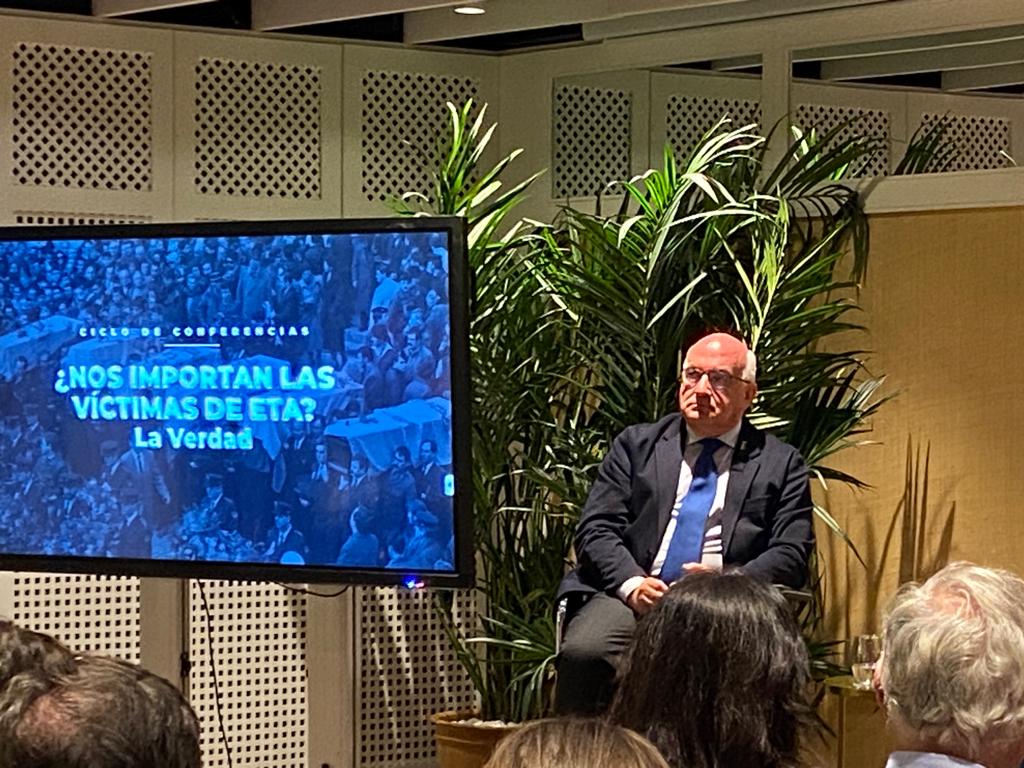CYCLE ON VICTIMS OF TERRORISM ORGANIZED BY THE FOUNDATION VILLACISNEROS

On March 27th, the Villacisneros Foundation organized the second conference of the cycle “Do we care about the victims of ETA? On this occasion, the second traditional invocation of the victims, Truth, was addressed. The participants were Ana Iribar, president of the Gregorio Ordoñez Foundation, Nicolás Redondo, former secretary general of the PSE and Javier Zarzalejos.
Ana Iribar introduced the conversation by asking the speakers about the possibility of an understanding between the PP and the PSOE on this issue and on others of decisive importance. Both Redondo and Zarzalejos agreed that, although it would be desirable, especially in such sensitive matters as the victims of terrorism, at this moment the partners of the Government and the Executive itself make it impossible, as they are active agents of the whitewashing of the political heirs of ETA.

Zarzalejos emphasized the appropriateness of the title of the session: the truth of the victims exists, it is an ethical and political truth, not a mere “story”. In this sense, he pointed out that this truth is so hard that it makes the revision of the recent past uncomfortable, to the point that today we live in a “very low ethical level”. However, he also expressed his conviction that it is possible to “return from that oblivion” without nostalgia, “working for the truth”.
In this regard, the MEP expressed his conviction that any future agreement in this field has to start from the same root that once gave birth to the Pact for Freedoms and against terrorism, which he described as the “last pact inspired by the values of ’78”, those that inspired the political transition to democracy.
Zarzalejos put a lot of emphasis on warning about the certain risk of historical, political and criminal impunity (the more than 300 murders pending judicial resolution). In this sense, he warned that, if a political change does not take place in Spain, the national impugnation of the Transition could coincide with an eventual access to power of Bildu-Batasuna in the Basque Country, a formation which he described as a “tumor of democracy”.
Zarzalejos pointed out the paradox that the successor brands of Batasuna were re-legalized on the grounds that they had condemned terrorism in their statutes, at the same time that those who wielded that argument continue today to demand a condemnation of ETA’s criminal trajectory which still does not take place.
The MEP stressed the political significance of the victims of terrorism, considering them as the “referential” victims of Spanish democracy, considering that -unlike others- they died without any side affiliation, “for the freedom of all”. In consideration of which, he censured that the formations that have not condemned a single one of the attacks and seek the historical and political impunity of ETA terrorism, are today strategic partners of the Government, while they work for “closing the circle of impunity” that has deformed the Basque political landscape and has weakened the State as a whole, threatening to result in “the funeral of the Spain of 78”.
Zarzalejos wanted to conclude with a message of hope, encouraging to recover the idea that “whoever challenges the State, loses it” and assuring that when society and the State “get down to it, the results are surprising”. And he concluded by encouraging to work so that “those who cheered the murders do not have the last word”.
